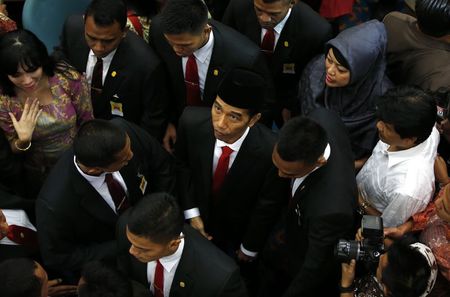By Kanupriya Kapoor
JAKARTA (Reuters) - Incoming Indonesian president Joko Widodo is trying to manage the expectations of his supporters and investors as an opposition-dominated parliament likely to obstruct his ambitious reform programme convenes on Wednesday.
Widodo, the popular former governor of the capital, Jakarta, narrowly won an election in July, becoming the first businessman to become president of Southeast Asia's biggest economy, which had previously always been led by members of political elites.
Widodo's simple, direct approach and success in cutting red tape appealed to ordinary voters and investors who welcomed his victory by pushing the stock market up to a record high.
Foreign companies including Japan's Mitsubishi Motors Corp and South Korea's Samsung Electronics Co Ltd have also been encouraged by his victory and announced plans to expand Indonesian operations.
But with the convening of the new parliament, where Widodo can only count on a minority coalition, as well as with pressures from within his own camp, the honeymoon looks to be over.
The president-elect and his transition team now aim to contain unrealistic expectations or they risk disillusioning supporters after taking office on Oct. 20.
"The expectations are very high," said Anies Baswedan, a senior member of Widodo's transition office.
"It's difficult to please all sides and we have to be prepared to deal with that fallout."
The opposition, led by the party of losing presidential candidate and retired general Prabowo Subianto, takes issue with many of Widodo's plans, such as cutting fuel subsidies, and it has been giving him a taste of what looks to be in store.
Prabowo's coalition scored a major victory in the dying days of the old parliament session by depriving Widodo's Indonesian Democratic Party-Struggle of the coveted parliament speaker position.
A hostile speaker and opposition bloc could hold the government's programmes "hostage" by hijacking debate, Widodo's allies fear.
Given the rivalry in the new parliament, a senior member of the Widodo's transition team warned against expecting too many sensational developments, or "wow factors", in the first 100 days of the new president's term.
"What may be a wow factor for us may not be a wow factor for the international community," said the team member, who declined to be identified.
'POLITICAL DRAMA'
In a painful illustration of Widodo's legislative vulnerability, the opposition last week pushed through a bill scrapping direct elections for provincial, district and city leaders.
Widodo warned that the vote would be a "step back for democracy" but was powerless to block it.
"The political drama likely shows the future political map in parliament," brokerage house Mandiri Sekuritas said in a report.
Widodo's principles are also a source of contention for some members of his own side.
His refusal to swap cabinet posts for support may have endeared him to graft-weary voters but members of elites within his own coalition object, according to one party insider who asked not to be identified due to the sensitivity of the issue.
This month, apparently forced to give ground, Widodo said just over half his cabinet would be technocrats with the rest of the posts going to "party professionals".
Earlier, he had said approximately 80 percent of his cabinet would be technocrats.
Baswedan said the new president was mapping out plans for his early days with a high-powered transition team, members of which have been drawn from financial services companies such as McKinsey and Bank Mandiri.
Political analyst Paul Rowland said Widodo had been good at managing expectations as Jakarta governor.
"Stepping up to the national level, it is going to be a lot more complex and there are more areas to provide disappointment," Rowland said.

"He's going to have a steep learning curve."
(Additional reporting by Yayat Supriatna and Fransiska Nangoy; Editing by Robert Birsel)
